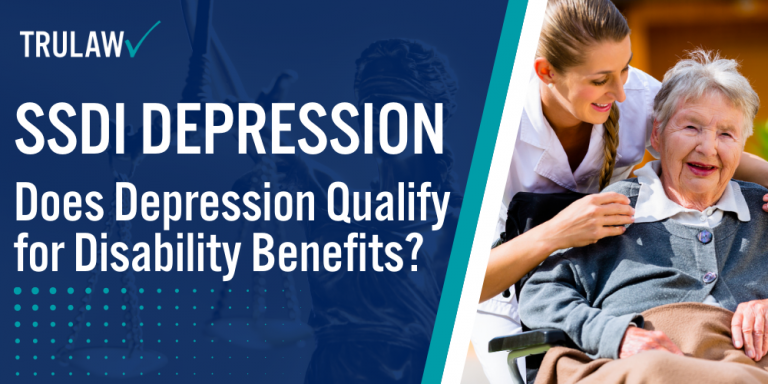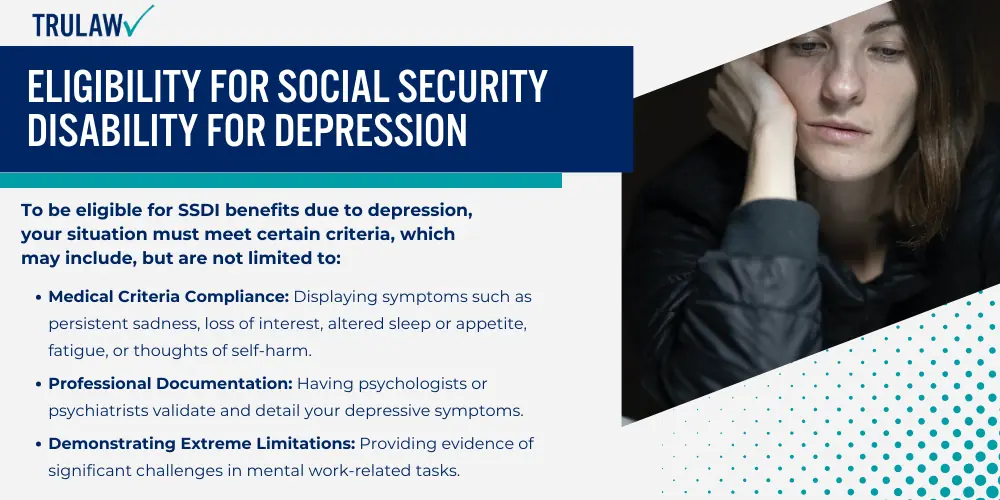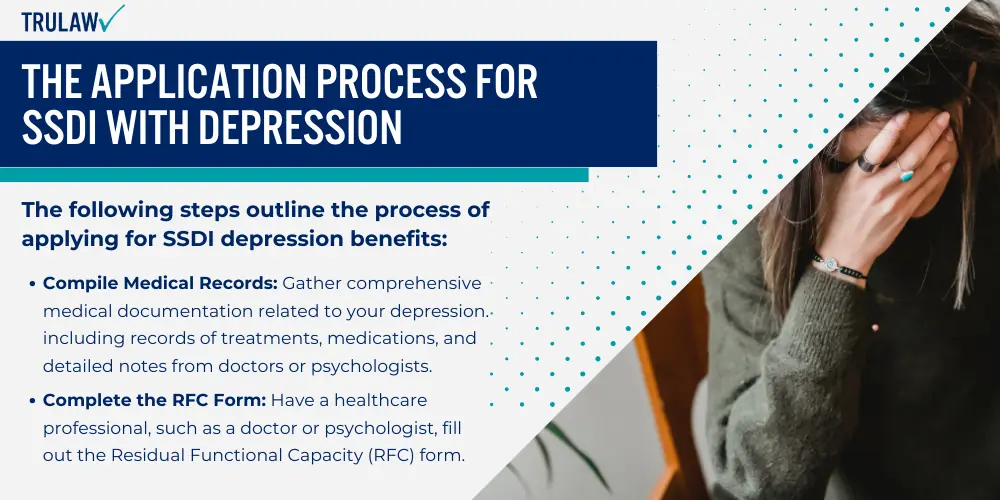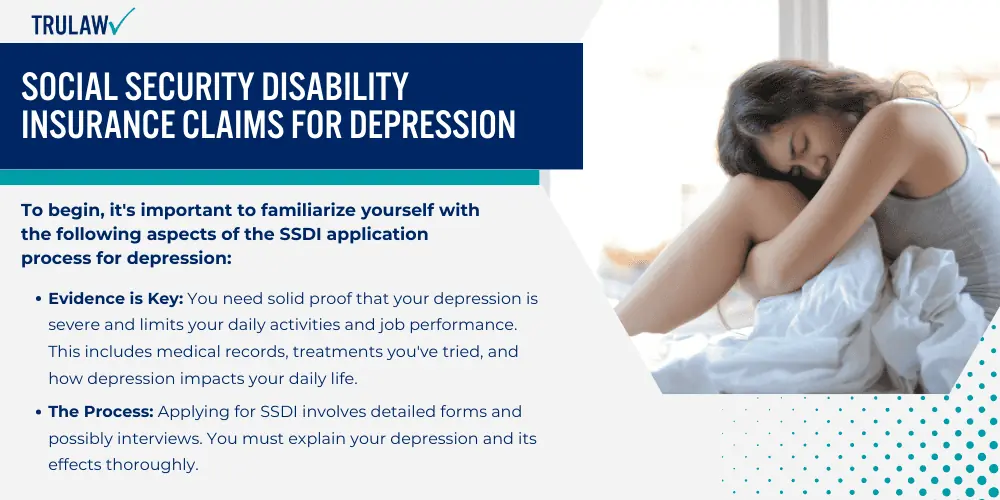SSDI Depression: Does Depression Qualify for Disability Benefits?
- Last Updated: June 12th, 2025

Attorney Jessica Paluch-Hoerman, founder of TruLaw, has over 28 years of experience as a personal injury and mass tort attorney, and previously worked as an international tax attorney at Deloitte. Jessie collaborates with attorneys nationwide — enabling her to share reliable, up-to-date legal information with our readers.
Legally Reviewed
This article has been written and reviewed for legal accuracy and clarity by the team of writers and legal experts at TruLaw and is as accurate as possible. This content should not be taken as legal advice from an attorney. If you would like to learn more about our owner and experienced injury lawyer, Jessie Paluch, you can do so here.
Fact-Checked
TruLaw does everything possible to make sure the information in this article is up to date and accurate. If you need specific legal advice about your case, contact us by using the chat on the bottom of this page. This article should not be taken as advice from an attorney.
Key takeaways:
- Depression can be a disability for SSDI if it's severe and stops you from working for at least a year.
- You need proof from doctors or therapists and records that show how your daily life is affected.
- TruLaw #1 SSDI Depression Lawyer can guide people through applying for benefits due to depression.
Overview of SSDI Depression Benefits
Question: Do I qualify for SSDI depression benefits?
Answer: To qualify for Social Security Disability Insurance (SSDI) benefits for depression, you must have worked in jobs covered by Social Security and have a medical condition that meets Social Security’s definition of disability.
On this page, we’ll discuss this question in further depth, provide an overview of SSDI depression benefits, eligibility criteria to file for SSDI depression benefits, and much more.

SSDI Depression Disorders: Evaluation Process
There’s a 5-month waiting period before benefits are paid, and they usually continue until you can work again regularly.
The process of determining if you have a qualifying disability is:
- A step-by-step evaluation of your work activity;
- The severity of your condition; and
- Your ability to perform past or other types of work.
If you or a loved one are filing an SSDI application or appeal, contact TruLaw today using the chat on this page to receive an instant case evaluation.
Discover how the SSDI Lawyers within TruLaw’s legal network can help you today.
Table of Contents
Eligibility for Social Security Disability for Depression
Eligibility for Social Security Disability due to depression hinges on specific criteria that align with SSDI guidelines.

The condition must be medically documented and exhibit a level of severity that impairs one’s ability to engage in substantial gainful activity.
SSDI Depression: Qualification Criteria
Depression can hit hard, and sometimes it’s so severe that working becomes impossible.
If this is you, Social Security Disability Insurance (SSDI) may recognize your depression as a disability and provide help.
To be eligible for SSDI benefits due to depression, your situation must meet certain criteria, which may include, but are not limited to:
- Medical Criteria Compliance: Displaying symptoms such as persistent sadness, loss of interest, altered sleep or appetite, fatigue, or thoughts of self-harm.
- Professional Documentation: Having psychologists or psychiatrists validate and detail your depressive symptoms.
- Demonstrating Extreme Limitations: Providing evidence of significant challenges in mental work-related tasks.
- Cognitive Function Impairment: Showing difficulties in understanding, learning, or applying information.
- Social Interaction Challenges: Proving depression hinders effective communication or interaction in a work setting.
- Self-Management Struggles: Illustrating inability to adapt to changes or manage personal needs.
- Concentration and Pace Difficulties: Documenting issues with focus or maintaining a consistent work pace.
- Chronic Severity Evidence: Presenting medical records that reflect long-term, severe depression, monitored by healthcare professionals.
To get SSDI benefits for major depressive disorder and other mental health conditions related to depression like bipolar disorder and anxiety disorders:
- You’ve got to prove these issues have been there for at least two years.
- There should be evidence of ongoing medical treatment.
- Daily life must be greatly affected; perhaps the simple act of getting dressed is now tough because of how depressed you feel.
For SSDI benefits based on major depressive episodes:
- SSA will check if you’ve worked enough in recent years.
- They’ll look at the taxes taken from your pay when they decide if you’ve earned enough “work credits.”
Even though there’s usually a five-month wait after approval:
- A little while later, they let some folks try working again while still getting SSDI money.
- They want people to find out if they can go back into the workplace without losing their benefits right away.
Types of Depression Considered for SSDI Benefits
Depression is a mental health condition that can severely impact a person’s ability to function daily and maintain employment.
Social Security evaluates different forms of depression when determining eligibility for disability benefits.
The types of depression that may qualify for SSDI benefits include, but are not limited to:
- Major Depressive Disorder: This condition involves profound sadness or a lack of interest in almost all activities for a minimum of two weeks.
- Persistent Depressive Disorder: Characterized by a chronic state of depression, where the individual feels down most of the time for two years or more.
- Bipolar Disorder: This disorder is marked by extreme mood swings, ranging from periods of high energy to episodes of deep sadness.
- Depression Due to Another Medical Condition: In some cases, individuals suffer from depression as a direct result of another medical condition, significantly impacting their mood.
It is essential for a medical professional to diagnose these conditions to qualify for SSDI benefits.
Each type of depression can severely affect individuals, making everyday life and work challenging to manage.
Social Security will assess how your specific type of depression hinders your ability to perform regular activities before approving monthly benefits.
The Social Security Disability Evaluation Process for Depression
The assessment for SSDI due to depression involves a rigorous examination of both medical and personal factors, taking into account the extent to which this mental health condition affects one’s life.
It is critical that applicants provide comprehensive evidence that demonstrates the impact of depression on their ability to perform work-related tasks.
The role of medical and non-medical evidence
Medical and non-medical evidence both play a big role in Social Security Disability claims for depression.
Medical records, like those from your doctor or therapist, show how serious your depression is.
They include details about treatments you’ve tried and how well they worked.
Notes from healthcare providers can describe symptoms like lack of energy or trouble concentrating.
But there’s more to it than just doctor’s notes.
Evidence can also come from other people who know what you’re going through.
Family members, past bosses, and friends might tell how depression changes the way you act at home or work.
Reports from social workers could explain daily challenges you face because of your condition.
All this proof comes together to help make a strong case that shows the true impact of your depression on life and work.
The importance of consistent treatment records
Having steady treatment records is key when you’re seeking SSDI for depression.
These records show the Social Security Administration (SSA) how your depression affects you over time.
They look at details like how often you see your doctor and if your depression makes it hard for you to work.
Records that track your visits to mental health therapy, the different treatments you’ve tried, and notes from professionals all help tell the story of your condition.
Solid evidence in these records can make a strong case for SSDI benefits.
It’s like showing a full picture of how deep and serious your depression is.
SSA checks whether major life activities are tough for you or if working seems impossible due to extreme limitation of one or more aspects of mental functioning.
Consistent records prove that, despite getting help, doing regular tasks remains a struggle because of your illness – making them essential pieces in seeking financial assistance through disability benefits.
Essential Factors in a Depression-based SSDI Claim
When pursuing SSDI benefits for depression, specific elements can make or break your claim.
These critical factors range from the depth of your clinical depression to the documented impacts on daily life — all scrutinized to gauge if you meet SSDI’s stringent requirements.
Severity of depression
Depression can be very strong and cause big problems in a person’s life.
To get SSDI, this kind of depression must last for a long time and be tough to handle.
The law says you need at least five big signs of depression to show it’s serious enough.
These might include being very sad, losing interest in almost everything, eating too much or too little, trouble sleeping or sleeping all the time, feeling super tired, having trouble thinking or making decisions, or having thoughts about hurting yourself.
For SSDI claims for depression disability, how much your daily life is affected is critical.
You should have big troubles with things like paying attention or finishing tasks.
Your ability to interact with others could also be really limited.
Adapting to change and managing yourself might be hard too.
Social Security looks closely at these areas to decide if someone really needs help because of their depression.
Treatment history and response
Social Security checks how you respond to mental health treatment.
They want to know if medicines or therapy help your depression.
If you still can’t work despite getting help, Social Security may see your condition as more serious.
Your doctor’s notes play a big part here—they show what treatments you tried and how your depression changed over time.
Proof of going to the doctor regularly matters too.
It shows that you’re trying hard to get better but are still struggling with symptoms like sad moods or not enjoying things at all.
Records showing that you’ve tried different treatments could be strong evidence for your SSDI claim for depression.
Impact on daily functioning and ability to work
Depression can hit hard, making even simple tasks feel tough.
Some people might find it hard to get out of bed or to care for themselves.
They could struggle with focusing on work, lose interest in things they used to enjoy, and have trouble getting along with others.
For many, this means not being able to do their job well or at all.
When someone has such heavy depression that affects work life, SSDI benefits might be an option.
This help is for those who can’t earn a living because their condition stops them from working like before.
Getting these benefits depends on showing how depression limits the ability to keep a job and handle daily activities.
The Application Process for SSDI with Depression
Applying for Social Security Disability Insurance (SSDI) due to depression requires thorough preparation and detailed documentation.

The following steps outline the process of applying for SSDI depression benefits:
- Compile Medical Records: Gather comprehensive medical documentation related to your depression. This includes records of treatments, medications, and detailed notes from doctors or psychologists.
- Complete the RFC Form: Have a healthcare professional, such as a doctor or psychologist, fill out the Residual Functional Capacity (RFC) form. This form assesses your remaining work capability despite your depression.
- Document Daily Life Impact: Record specific ways in which depression affects your daily activities, such as personal care, cooking, cleaning, and social interactions.
- Employment History Review: List your employment history for the past 15 years, focusing on how depression has impacted your job performance and ability to work.
- Check SSA’s “Blue Book” Criteria: Review the Social Security Administration’s “Blue Book” to understand the specific criteria for mental disorders, ensuring your condition aligns with their standards.
- Gather Additional Testimonials: Obtain statements from friends, family, or coworkers who can attest to the impact of depression on your daily life and functioning.
- Carefully Complete Application Forms: Fill out all necessary forms accurately and thoroughly. Errors or omissions can delay the processing of your application.
- Choose Your Application Method: You can apply online, at a local Social Security office, or by phone. Ensure to keep copies of all submitted documents for your records.
Remember, the key to a successful SSDI application for depression lies in providing detailed, consistent, and comprehensive evidence of how the condition limits your ability to work and perform daily activities.
Medical documentation needed
To apply for SSDI with depression, you must provide clear medical records.
These documents prove your condition and its effects on your life.
Here’s what to gather:
- A formal diagnosis of depression from a qualified doctor or psychologist.
- Detailed records showing you have at least five major depression symptoms, such as depressed mood, decreased energy, or sleep disturbance.
- Notes on how long these symptoms have lasted and their impact on your daily tasks.
- Information about any treatment you’ve received, like antidepressant medications or therapy.
- Statements from your doctor about how depression affects your ability to work.
- The Residual Functional Capacity (RFC) form completed by a healthcare professional, which outlines specific limitations caused by depression.
- Evidence of consistent treatment attempts and the results over time.
How to present your case effectively
Show that your depression is serious and keeps you from working.
Put together medical records, doctor’s notes, and treatment history to make your point strong.
Talk about how the depression makes everyday tasks hard for you, like eating right, sleeping well, or getting along with others.
You might also want to share stories of times when your depression made it tough to handle normal work stuff.
This could be about not being able to focus or missing too much work because you felt really down.
Use clear examples that show why doing a job every day is too hard for you right now.
Social Security Disability Insurance Claims for Depression
Getting Social Security Disability Insurance (SSDI) for depression can be complex.

It’s all about showing clearly how depression affects your daily life and your ability to work.
To begin, it’s important to familiarize yourself with the following aspects of the SSDI application process for depression:
- Evidence is Key: You need solid proof that your depression is severe and limits your daily activities and job performance. This includes medical records, treatments you’ve tried, and how depression impacts your daily life.
- The Process: Applying for SSDI involves detailed forms and possibly interviews. You must explain your depression and its effects thoroughly.
Remember, every case is unique, and having the right support and evidence makes a big difference.
Importance of professional guidance
Getting help from a professional when dealing with SSDI for depression is key.
Experts understand the laws and know how to show that your depression is serious enough for disability benefits.
They can make sure you meet all the Social Security Administration’s rules and have the right medical records.
This support makes your claim stronger.
Professionals also guide you through each step, which can be very confusing without their help.
They work with you on your application, gathering evidence, and even at hearings if needed.
Potential outcomes of claims
When you apply for SSDI because of depression, different things might happen.
You could get disability benefits if SSA believes your depression is very serious and stops you from working for at least a year.
They will look at how bad your depression is, your treatment history, and how it affects your daily life and job.
Sometimes, even if the standard criteria are not met, the SSA may still approve benefits under what’s called a Medical Vocational Allowance.
This happens when they see that your depression makes it hard to do any kind of work.
If the claim does not meet all the requirements, don’t lose hope — an Administrative Law Judge might decide in favor during a hearing.
With this judge’s help, you have another chance to show why you need support due to your mental health condition.
The process takes time though; patience is key as SSA reviews everything carefully before making their final decision on giving social security disability benefits or not.
The impact of depression on daily living and work capability.
Depression can make even simple things feel hard.
People with this illness may find getting out of bed, eating, or taking a shower difficult.
They might lose interest in hobbies they used to love and have trouble keeping up with friends and family.
At work, they could struggle with tasks that once were easy.
Concentrating, making decisions, and sticking to deadlines often become tough challenges.
The illness also affects jobs because it’s hard for people to stay focused and move at the needed speed.
Many times their energy is so low that they do not finish their work on time or do it well.
Some need lots of breaks just to get through the day.
This can lead to missed days at work or even losing a job, which adds more stress and makes depression worse.
TruLaw #1 SSDI Depression Lawyer
If you’re grappling with depression that hinders your ability to work, TruLaw is here to assist you.
Our extensive legal network is well-versed in the difficulties you encounter and possesses the expertise required to steer you through the SSDI application process.
Reasons to choose TruLaw, a personal injury firm adept at handling SSDI depression claims:
- Expertise in Mental Health Claims: Our focus on mental health issues, including depression, ensures your case is managed with the appropriate expertise and empathy.
- Personalized Attention: We acknowledge the distinct nature of your circumstances and commit to providing the individualized attention your case deserves.
- Proven Track Record: With years of experience, we bring a legacy of successful claims, demonstrating our ability to effectively advocate for and secure your benefits.
- No Upfront Fees: Committed to accessible legal support, we offer our services on a contingency basis—you only pay if we succeed on your behalf.
- Ease of Communication: Ensuring you are well-informed at every stage is essential to us. Reach out to TruLaw today using the chat on this page for an immediate case evaluation.
Should you or someone you care about be preparing an SSDI application or appeal due to depression, get in touch with TruLaw promptly using the chat on this page for an instant case assessment.
Learn how the SSDI Lawyers within TruLaw’s legal network can support you in your time of need.
Social Security Disability Insurance Frequently Asked Questions
-
Yes, depression can be classified as a mental or physical impairment under the Social Security Disability Insurance (SSDI) program.
The Social Security Administration (SSA) recognizes severe depression as a disabling condition when it significantly limits an individual’s ability to perform basic work activities.
To qualify, one must demonstrate, through medical documentation, that the depression significantly impairs their mental and/or physical function, affecting their ability to work.
-
The SSA pays disability benefits to individuals whose depression is severe enough to prevent them from maintaining pace in adapting to work-related activities.
The assessment involves a thorough evaluation of the applicant’s ability to understand, remember, and apply information; interact with others; concentrate and maintain pace; and adapt or manage themselves in a work environment.
Applicants must provide substantial medical evidence documenting these limitations, including detailed reports from treating physicians and mental health professionals.
-
While the Americans with Disabilities Act (ADA) and SSDI are distinct, the ADA’s broader definition of disabilities, which includes mental impairments like depression, influences how mental health conditions are perceived in SSDI claims.
The ADA requires reasonable accommodations for individuals with disabilities, which reinforces the idea that mental health impairments, such as depression, should be given serious consideration in SSDI claims.
However, the specific criteria for SSDI benefits, including the severity and impact of the impairment on work ability, are governed by the SSA’s guidelines.

Managing Attorney & Owner
With over 25 years of legal experience, Jessica Paluch-Hoerman is an Illinois lawyer, a CPA, and a mother of three. She spent the first decade of her career working as an international tax attorney at Deloitte.
In 2009, Jessie co-founded her own law firm with her husband – which has scaled to over 30 employees since its conception.
In 2016, Jessie founded TruLaw, which allows her to collaborate with attorneys and legal experts across the United States on a daily basis. This hypervaluable network of experts is what enables her to share the most reliable, accurate, and up-to-date legal information with our readers!
Additional Social Security Disability Insurance resources on our website:
Here, at TruLaw, we’re committed to helping victims get the justice they deserve.
Alongside our partner law firms, we have successfully collected over $3 Billion in verdicts and settlements on behalf of injured individuals.
Would you like our help?
At TruLaw, we fiercely combat corporations that endanger individuals’ well-being. If you’ve suffered injuries and believe these well-funded entities should be held accountable, we’re here for you.
With TruLaw, you gain access to successful and seasoned lawyers who maximize your chances of success. Our lawyers invest in you—they do not receive a dime until your lawsuit reaches a successful resolution!
AFFF Lawsuit claims are being filed against manufacturers of aqueous film-forming foam (AFFF), commonly used in firefighting.
Claims allege that companies such as 3M, DuPont, and Tyco Fire Products failed to adequately warn users about the potential dangers of AFFF exposure — including increased risks of various cancers and diseases.
Depo Provera Lawsuit claims are being filed by individuals who allege they developed meningioma (a type of brain tumor) after receiving Depo-Provera birth control injections.
A 2024 study found that women using Depo-Provera for at least 1 year are five times more likely to develop meningioma brain tumors compared to those not using the drug.
Suboxone Tooth Decay Lawsuit claims are being filed against Indivior, the manufacturer of Suboxone, a medication used to treat opioid addiction.
Claims allege that Indivior failed to adequately warn users about the potential dangers of severe tooth decay and dental injuries associated with Suboxone’s sublingual film version.
Social Media Harm Lawsuits are being filed against social media companies for allegedly causing mental health issues in children and teens.
Claims allege that companies like Meta, Google, ByteDance, and Snap designed addictive platforms that led to anxiety, depression, and other mental health issues without adequately warning users or parents.
Transvaginal Mesh Lawsuits are being filed against manufacturers of transvaginal mesh products used to treat pelvic organ prolapse (POP) and stress urinary incontinence (SUI).
Claims allege that companies like Ethicon, C.R. Bard, and Boston Scientific failed to adequately warn about potential dangers — including erosion, pain, and infection.
Bair Hugger Warming Blanket Lawsuits involve claims against 3M — alleging their surgical warming blankets caused severe infections and complications (particularly in hip and knee replacement surgeries).
Plaintiffs claim 3M failed to warn about potential risks — despite knowing about increased risk of deep joint infections since 2011.
Baby Formula NEC Lawsuit claims are being filed against manufacturers of cow’s milk-based baby formula products.
Claims allege that companies like Abbott Laboratories (Similac) and Mead Johnson & Company (Enfamil) failed to warn about the increased risk of necrotizing enterocolitis (NEC) in premature infants.
Here, at TruLaw, we’re committed to helping victims get the justice they deserve.
Alongside our partner law firms, we have successfully collected over $3 Billion in verdicts and settlements on behalf of injured individuals.
Would you like our help?

